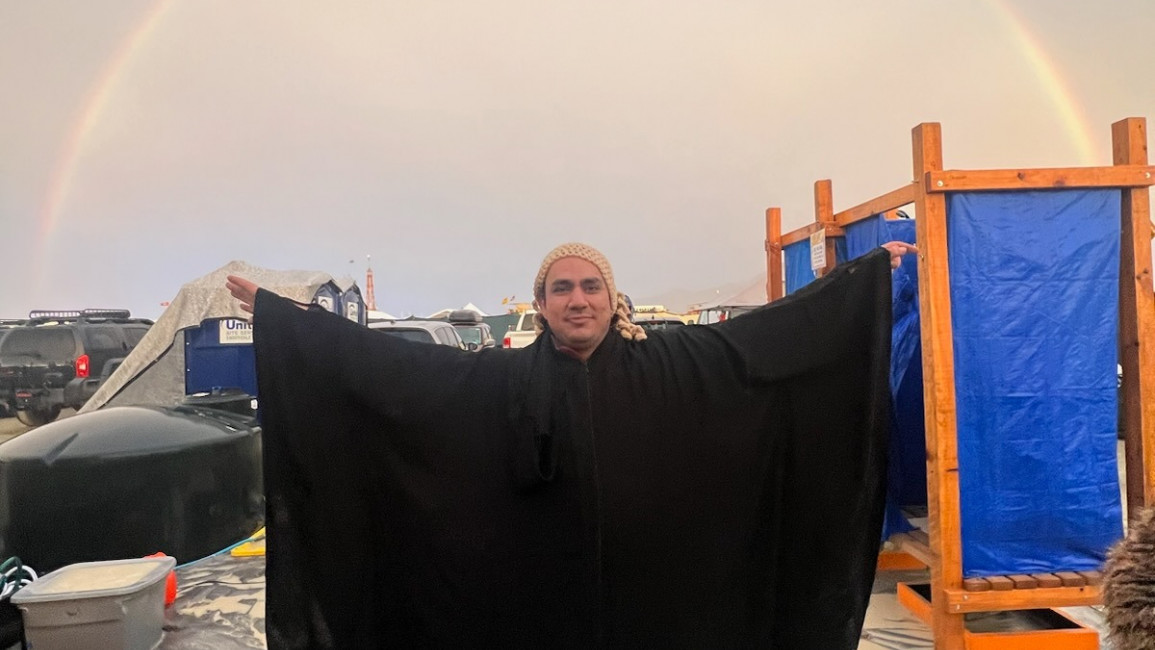Burning Man: 'Crisis? What crisis?' says Iraqi attendee
Tens of thousands of festivalgoers are finally leaving the site of the Burning Man festival in northern Nevada after being stranded for over 48 hours due to mud and extreme weather.
Among the attendees this year was Iraqi-American writer and researcher Faisal Saeed Al-Mutar, who despite the chaos was largely positive about his experiences at the arts and music festival.
Al-Mutar, 32, was drawn to the festival due to its "counter-cultural" ethos and the opportunity to meet like-minded individuals. "It was fun and quite dusty, movement was pretty easy, and I got a good gist of the festival. So, I am glad I came in earlier," he told The New Arab.
An unexpected downpour on Friday, with half an inch (1.3 cm) of rain, resulted in flooding and foot-deep mud. Approximately 80,000 participants found themselves stranded over the weekend. Evacuation efforts commenced on Monday, once conditions permitted.
A notorious counter-culture event drawing in thousands
Held annually in the western United States, Burning Man is a week-long desert gathering centred on 'community, art, self-expression, and self-reliance'.
The event also centres around a rejection of corporatism and capitalism.
Burning Man is renowned for its creative art installations, which range from imaginative vehicles to metallic sculptures.
It also has a notorious reputation for hedonism, with displays of nudity, open sexuality, and drug use.
The event's name comes from its culminating ceremony: the burning of a large wooden effigy shaped like a man and a wood temple structure during the final two nights.
Some Burning Man fans interpret this ritual as a symbol that promises to carry the 'fire of passion and creativity' after the event. Others believe the ritual began when the festival's founders built a similar effigy and burned it as one of them dealt with the anger of a romantic breakup.
Rain gets in the way
The road closures, resulting from unusually heavy rain, came just before the first of the ceremonial fires signalling the end of the festival was scheduled for Saturday night.
The ceremonial fires were postponed this year as authorities worked to reopen exit routes by Monday.
Book Club: Set between Pakistan and London, Awais Khan’s latest story delves into misogyny, abuse and perseverance. https://t.co/cQtWs230TZ
— The New Arab (@The_NewArab) August 30, 2023
Social media users seemed amused at the idea of festival-goers, who had paid between $200 to $2,800 for tickets, being stuck in the desert, particularly with its reputation of attracting Big Tech workers. At the festival, however, attendees kept up their spirits despite the challenges.
Al-Mutar said: "There were people from all over different socioeconomic backgrounds, and it is sad to see many in the media speak in hyperboles and sensational terms by calling it a humanitarian crisis."
It was more like rain than a flood; movement started getting more difficult because of the mud, but there was no panic. People mostly stayed at the camp or went to neighboring camps and took care of each other. The feeling was amazing and pretty communal. The Rainbow added beauty to the scene.
"My family was slightly worried because of the media hype and sensationalism and thought I was stuck in a war zone, but we had internet, and there was some phone signal at night and some people were donating their Wi-Fi for me to contact my family and friends and let them know I am okay."
Comparing life in his war-torn homeland to the fleeting challenges of the festival, he said: 'The mud is a piece of cake for someone who survived the Iraq war."
"Calling it [a war zone] is an insult to those who live in a real crisis in Ukraine, Syria, Afghanistan, Sudan, and other places," the Iraqi writer said.
"My perspective: it was a new and positive experience, would happily do it again if I had the time in the future... I went with a fellow Iraqi and a Syrian, and they had a relatively similar experience. Our camp had people from all over the world."



